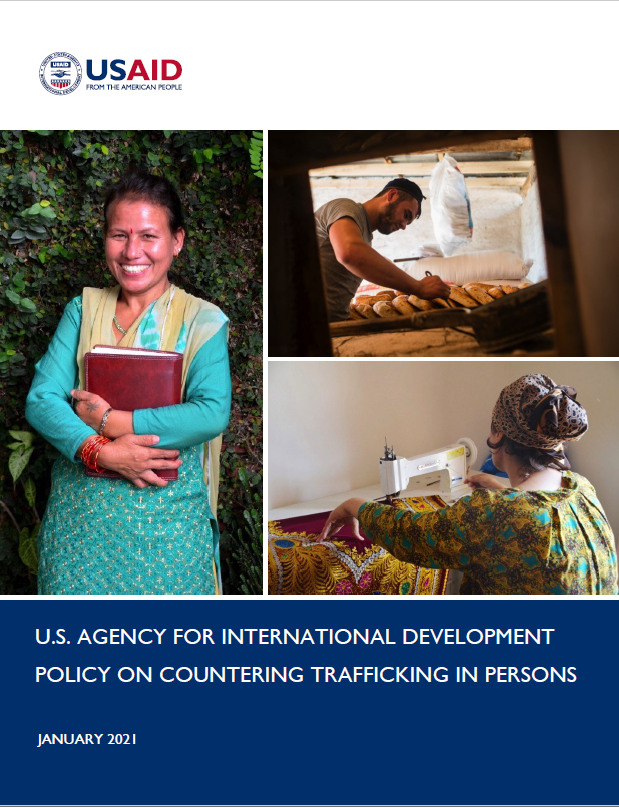- What We Do
- Agriculture and Food Security
- Democracy, Human Rights and Governance
- Democracy, Human Rights and Governance Strategy
- Supporting Free and Fair Elections
- Supporting Vibrant Civil Society & Independent Media
- Protecting Human Rights
- Promoting Accountability & Transparency
- Importance of Democracy, Human Rights, & Governance to Development
- COVID-19: Issues and Potential USAID Responses
- Countering Trafficking in Persons
- Global Labor Program
- Religious Freedom
- Youth Impact
- Economic Growth and Trade
- Education
- Environment and Global Climate Change
- Gender Equality and Women's Empowerment
- Global Health
- Humanitarian Assistance
- Transformation at USAID
- Water and Sanitation
- Working in Crises and Conflict
- U.S. Global Development Lab
Speeches Shim
USAID Policy for Counter-trafficking in Persons ![]() (pdf - 1 MB)
(pdf - 1 MB)
The United States Agency for International Development (USAID) deems counter-trafficking in persons (C-TIP) and the protection and empowerment of survivors a high priority that advances the Agency’s mission. Agency staff play an active role in countering trafficking by integrating C-TIP into their sectoral programming, abiding by the Agency’s C-TIP Code of Conduct, and educating implementing partners about C-TIP provisions in awards and enforcing them.
The Trafficking Victims Protection Act of 2000 (TVPA) guides our work at USAID and defines trafficking in persons (TIP) as a crime that uses force, fraud, or coercion for the purpose of exploiting an individual for profit through forced labor or sexual exploitation. This Policy uses the “4Ps” paradigm of Prevention, Protection, Prosecution, and Partnerships. It takes a victim-centered approach, committing USAID to protecting and promoting the healing and empowerment of victims and survivors using trauma-informed, survivor-informed, and culturally competent approaches. USAID tailors our programs according to local and regional contexts to serve the vulnerable and marginalized populations most susceptible to trafficking. This Policy also increases opportunities for survivors to serve as genuine partners in the design of policies and programs that affect them.
The Policy leverages the U.S. Government’s interagency and USAID’s comparative advantage of on-the-ground presence in humanitarian and development contexts. It seeks out strategic partnerships, including with host governments, local faith-based and community organizations, and the private sector, to foster self-reliance. It also calls for USAID’s C-TIP work to be data-driven and bring successful programs to scale. Finally, the Policy stresses the need for high ethical standards for all Agency staff and implementing partners to safeguard against exploitation and abuse.
Moving forward, USAID will focus on five programming objectives:
- Increased Integration of C-TIP into USAID’s Initiatives and Programs;
- Enhanced Technical Support and Coordination to Combat Modern Slavery;
- Improved Application of Learning, Evaluation, and Research in C-TIP;
- Increased Impact on Host-Government Partners; Civil Society, including Faith-Based Organizations; the Private Sector; and Beneficiaries; and
- Strategic C-TIP Investments in Targeted Countries.
In alignment with USAID’s broader humanitarian and development priorities, this Policy seeks to achieve the following outcomes:
- Improve our understanding and use of victim-centered approaches to ensure the dignity, well-being, and empowerment of beneficiaries;
- Work with host-country governments; civil society, including faith-based organizations; and the private sector to build their capacity to combat modern slavery;
- Enhance coordination within USAID and with the U.S. Government interagency;
- Draw on the best available evidence; and
- Provide clear roles and responsibilities for staff across USAID to implement effective C-TIP programming.
Under this Policy, USAID is committed to working alongside host governments, survivors, the U.S. Government interagency, faith-based and community organizations and other NGOs, as well as the private sector to build local, regional, and global capacity to end human trafficking and uphold the dignity of the human person.


Comment
Make a general inquiry or suggest an improvement.